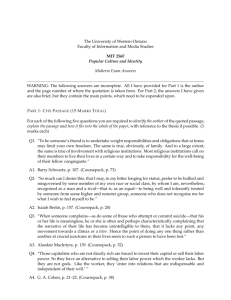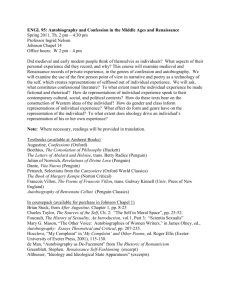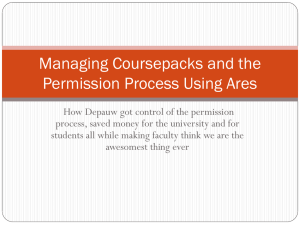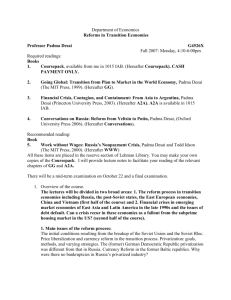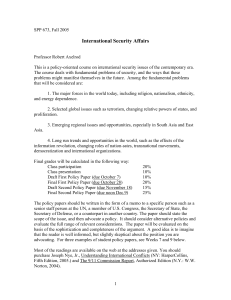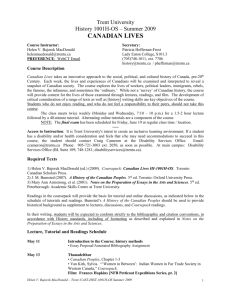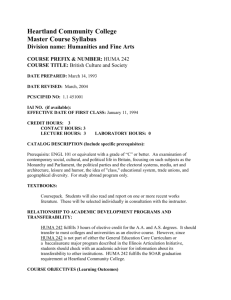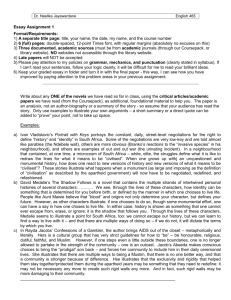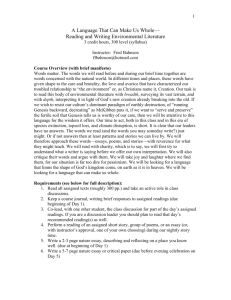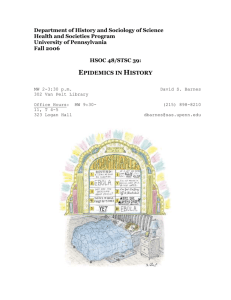P.S. 460 - Problems in World Politics
advertisement
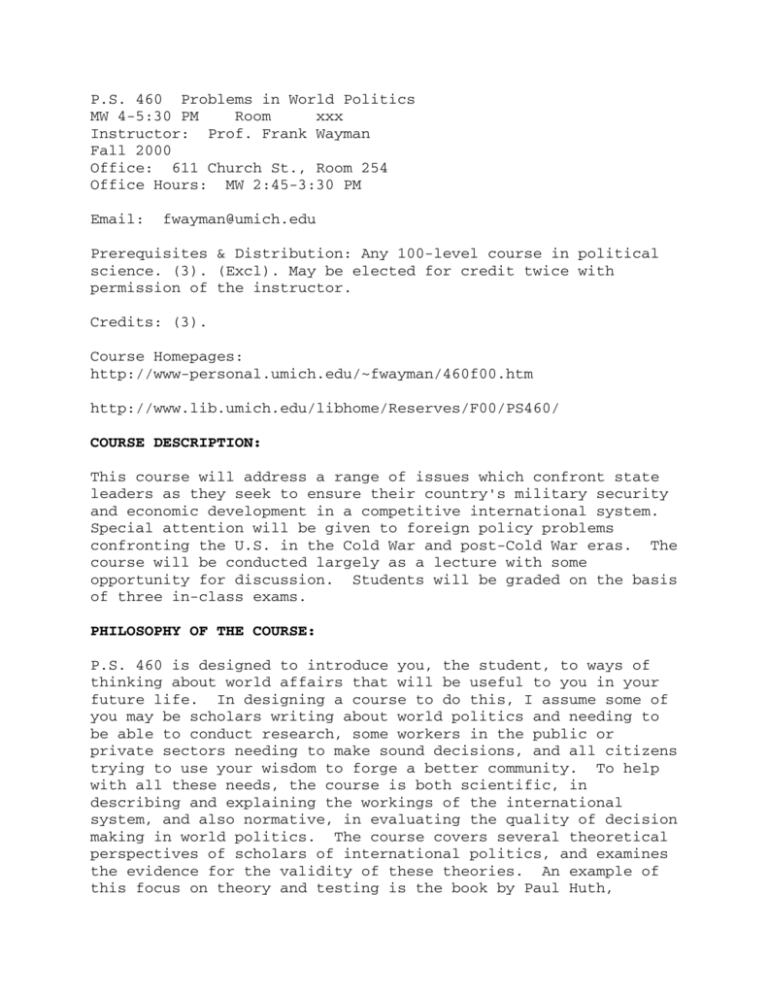
P.S. 460 Problems in World Politics MW 4-5:30 PM Room xxx Instructor: Prof. Frank Wayman Fall 2000 Office: 611 Church St., Room 254 Office Hours: MW 2:45-3:30 PM Email: fwayman@umich.edu Prerequisites & Distribution: Any 100-level course in political science. (3). (Excl). May be elected for credit twice with permission of the instructor. Credits: (3). Course Homepages: http://www-personal.umich.edu/~fwayman/460f00.htm http://www.lib.umich.edu/libhome/Reserves/F00/PS460/ COURSE DESCRIPTION: This course will address a range of issues which confront state leaders as they seek to ensure their country's military security and economic development in a competitive international system. Special attention will be given to foreign policy problems confronting the U.S. in the Cold War and post-Cold War eras. The course will be conducted largely as a lecture with some opportunity for discussion. Students will be graded on the basis of three in-class exams. PHILOSOPHY OF THE COURSE: P.S. 460 is designed to introduce you, the student, to ways of thinking about world affairs that will be useful to you in your future life. In designing a course to do this, I assume some of you may be scholars writing about world politics and needing to be able to conduct research, some workers in the public or private sectors needing to make sound decisions, and all citizens trying to use your wisdom to forge a better community. To help with all these needs, the course is both scientific, in describing and explaining the workings of the international system, and also normative, in evaluating the quality of decision making in world politics. The course covers several theoretical perspectives of scholars of international politics, and examines the evidence for the validity of these theories. An example of this focus on theory and testing is the book by Paul Huth, Standing Your Ground, on territorial disputes. The course also examines the trends in the world we are living in, to see in what ways things are remaining the same as in the past, and in what way things have changed. An example of this focus on the trends, cycles, and unique problems of our time is the book by Spanier and Hook, American Foreign Policy since World War II, as well as articles on post-Cold War global conditions. A Note on Keeping Up-to-date on Contemporary News: Much of the course deals with recent historical events (basically 1945present) because such events have provided useful cases for analysis. Because it is interesting to know how these situations apply to the present, current news sources that cover what is happening in world affairs remain important parts of a political science education. When I was a student in the 1960s, my professors in some courses assigned the daily New York Times and the weekly Economist as part of the required reading. At the dawn of the 21st century, good sources of news still include the New York Times and Economist. In addition, the BBC World Report on Ann Arbor cable channel 12 (Toledo PBS) at 6 PM is a good television source of world affairs, and the Washington Post weekly provides unsurpassed insight into American national affairs. (The ITN world news on Ann Arbor cable channel 6 [Detroit PBS ch. 56] at 7:30 PM provides good coverage for those who missed the BBC 6 PM broadcast.) Unfortunately, mainstream sources such as Time, Newsweek, and the U.S. nightly network news reports have deteriorated from their quality of past decades. Whatever source works for you, however, is what you should follow. Students in P.S. 460 should be familiar with contemporary news, as a step toward acquiring lifelong habits of keeping up on the news. Limited as our sources are, knowledge they provide of other societies and their relation to our own provides one of the few ways to attain a key goal of education: seeing beyond the horizons in which we each grew up. News, travel, and acquisition of foreign languages are vehicles that provide access to the global cultures which our world poltics courses are ultimately designed to examine and explain. GRADING: The course grade will be calculated as an average of the performance on three written exams, with each exam counting for one-third of the grade. To measure different aspects of student performance and understanding, exams will be a mixture of long essay questions, short answers, and multiple choice. The long essay questions will be selected at random from a set of questions passed out a week or two in advance of the exam. These questions will be designed to enhance and to assess students' ability to synthesize material and explain it to others. The short answer and multiple choice questions are intended to provide complementary measures of knowledge of specific aspects of the readings, lectures, and other class activities. The exams will take about one hour and ten minutes to complete, and will consist of 25 minutes for the long essay, about 25 minutes for the short answers and about 20 minutes for the multiple choice. TOPICS AND READING ASSIGNMENTS FOR THIS SEMESTER: Students should purchase the following books and other materials: Huth, Standing Your Ground. Kennedy, The Thirteen Days. Spanier and Hook, American Foreign Policy since World War II. A coursepack, available at Dollar Bill Copy (611 Church St., downstairs from the political science department offices). This semester, the course is arranged around several problems. The first problem is developing a vision of how the international system functions. From this we proceed to examine how to think about decision making in foreign affairs. Taking these analytic perspectives with us, we then we examine a series of problems faced by recent world leaders, as seen below: Contending Approaches to the Study of International Relations: Readings and Lecture: Frank Wayman and Paul Diehl, eds., "Realism Reconsidered: The Realpolitik Framework and Its Basic Propositions," in Frank Wayman and Paul Diehl, eds., Reconstructing Realpolitik, Ann Arbor, Mich.: Univ. of Michigan Press, ch. 1, pp. 3-28 on realism and its place in international relations. COURSEPAC Spanier and Hook, American Foreign Policy since World War II, preface and chs. 1-2 (pp. xi-51) Decision Making: Rational Choice and maximizing vs. Two Alternatives--Organizational Theory emphasizing how bureaucracies satisfice, and Psychological Viewpoints such as Cognitive Dissonance Theory emphasizing how people deny and rationalize. Graham Allison, Essence of Decision, excerpts COURSEPAC Robert Kennedy, 13 Days Cuban Missiles Crisis Simulation Timing of Events. COURSEPACK Douglas Hofstadter, "Metamagical Themas: Computer Tournaments of the Prisoner's Dilemma suggest how cooperation evolves," on the work of Robert Axelrod, in Scientific American, Vol. 248, No. 5 (May 1983), pp. 16-26. COURSEPACK Scott Sagan on proliferation, "The Perils of Proliferation: Organization Theory, Deterrence Theory, and the Spread of Nuclear Weapons," International Security, Vol. 18, No. 4 (spring 1994), pp. 66-107. COURSEPACK Spanier and Hook, American Foreign Policy since World War II, chs. 3-4 (pp. 52-121) The Historical Record of World Politics, 1945-2000: Overview Reading: Spanier and Hook, U.S. Foreign Policy since World War II, chs. 58 (pp. 122-231) Outbreak of the Cold War as a case in the onset of international rivalry: Kennan, "Sources of Soviet Conduct," Foreign Affairs, COURSEPACK Schlesinger, "Origins of the Cold War," Foreign Affairs, COURSEPACK Spanier and Hook, American Foreign Policy since World War II, ch. 2 EXAM ONE HERE, OCT. 11TH Continuation of the Cold War: What keeps rivalries going? What kept the Cold War going? What strategies were devised to try to end the Cold War? We will examine two: the GRIT strategy of Osgood and the linkage strategy of Kissinger. Readings: Holsti, "Cognitive Dynamics and Images of the Enemy" examining the psychological process of cognitive dissonance and its effect in prolonging conflict. COURSEPACK Robert Kennedy, 13 Days Spanier and Hook, American Foreign Policy since World War II, ch. 5-8. End of the Cold War: Spanier and Hook, American Foreign Policy since World War II, ch. 9 Evaluating Cold War Era Decision Making: Herek, Janis, and Huth, "Decision Making During International Crises," Journal of Conflict Resolution, 31, No. 2 (June 1987): 203-226. Mideast Affairs: Arab-Israeli Conflict: UN Res. 242 COURSEPACK The Economist, "The UN's missions impossible," Aug. 5, 2000, pp. 24-26. COURSEPACK Camp David Agreement COURSEPACK Tansa Massoud, "Fair Division, Adjusted Winner Procedure (AW), and the Israeli-Palestinian Conflict," Journal of Conflict Resolution, Vol. 44, No. 3, pp. 333-358 (June 2000) COURSEPACK Gulf War: Joshua Goldstein, Xiaoming Huang, and Burcu Akan, "Energy in the World Economy, 1950-1992," International Studies Quarterly, Vol. 41, No. 2 (June 1997), pp. 241-266. COURSEPACK Yugoslavia's Breakup and the Kosovo War: Barry Posen, "The War for Kosovo: Serbia's Political-Military Strategy," International Security, Vol 24, No. 4, spring 2000, pp. 39-84. COURSEPACK Territorial Conflicts: Huth, Standing Your Ground., pp. 1-192. EXAM TWO HERE, NOVEMBER 13TH Economic Sanctions: Robert Pape, "Why Economic Sanctions Do Not Work," International Security, Vol. 22, No. 2 (Fall 1997), pp. 90-136. COURSEPACK Kimberly Ann Elliott, "The Sanctions Glass: Half Full or Completely Empty?" International Security, Vol 23, No. 1, summer 1998, pp. 50-65. COURSEPACK Robert Pape, "Why Economic Sanctions Still Do Not Work," International Security, Vol 23, No. 1, summer 1998, pp. 66-77. Mueller and Mueller, "Sanctions of Mass Destruction," Foreign Affairs 78, 3 (1999): 43-53. COURSEPACK Post-Cold War Global Conditions: Spanier and Hook, American Foreign Policy since World War II, chs. 10-13 Zeev Maoz, "The Controversy over the Democratic Peace," International Security, Vol. 22, No. 1 (Summer 1997), pp. 162197. COURSEPACK Kristian Gleditsch and Michael Ward, "War and Peace in Space and Time: The Role of Democratization." International Studies Quarterly, Vol. 44, No. 1 (March 2000), pp. 1-30. COURSEPACK Francis Fukuyama, "The End of History?" The National Interest, summer 1989. COURSEPACK Samuel Huntington, "The Clash of Civilizations," Foreign Affairs, summer 1993. COURSEPACK Fareed Zakaria, "Culture is Destiny: A Conversation with Lee Kuan Yew," Foreign Affairs, March/April 1994. On "Asian values." COURSEPACK Fouad Ajami, "The Summoning," Foreign Affairs, Sept./Oct. 1993. COURSEPACK David Wilkinson, "Central Civilization," Comparative Civilizations Review, Fall 1987, pp. 31-32 (excerpts). COURSEPACK Ronald Inglehart, "Clash of Civilizations or Global Cultural Modernization? Evidence from 61 Societies," Institute for Social Research, University of Michigan, xerox. The Struggle for Economic Supremacy: Peter Peterson with John Sebinius, "The Primacy of the Domestic Agenda," in Graham Allison and Gregory Treverton, eds., Rethinking America's Security, N.Y.: W. W. Norton, 1992, pp. 5793. COURSEPACK Historical overview: Paul Kennedy, Rise and Fall of the Great Powers, introduction and pp. 3-72. COURSEPACK Erich Weede, "The West in Decline and the Rise of East Asia," in Erich Weede, Economic Development, Social Order, and World Politics, Boulder, Colo.: Lynne Rienner, 1996, pp. 91-118. Robert Reich, "The Three Jobs of the Future," in Robert Reich, The Work of Nations: Preparing Ourselves for 21st-Century Capitalism, N.Y.: Knopf, 1991, pp. 171-184. COURSEPACK LAST DAY OF CLASSES IS WED., DEC.13TH FINAL EXAM WILL BE THURS., DEC. 21, 8-10 AM
